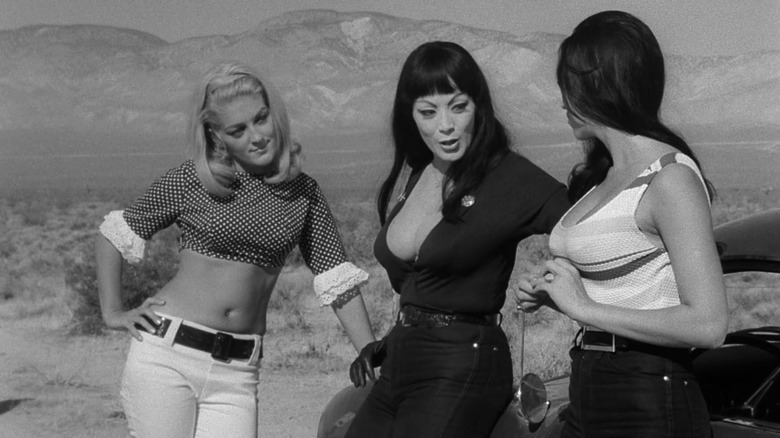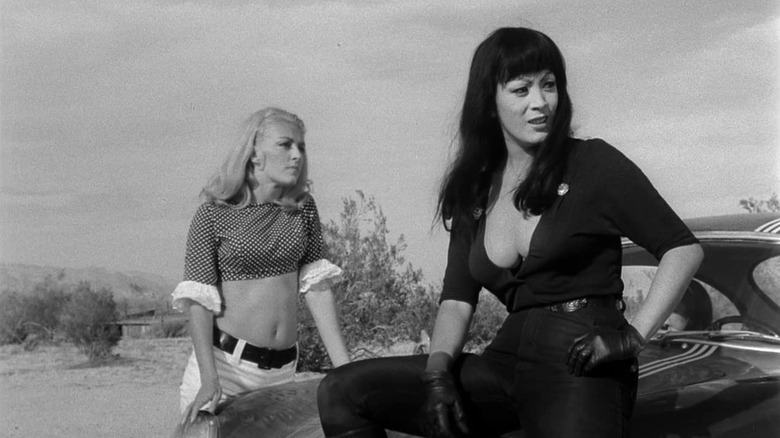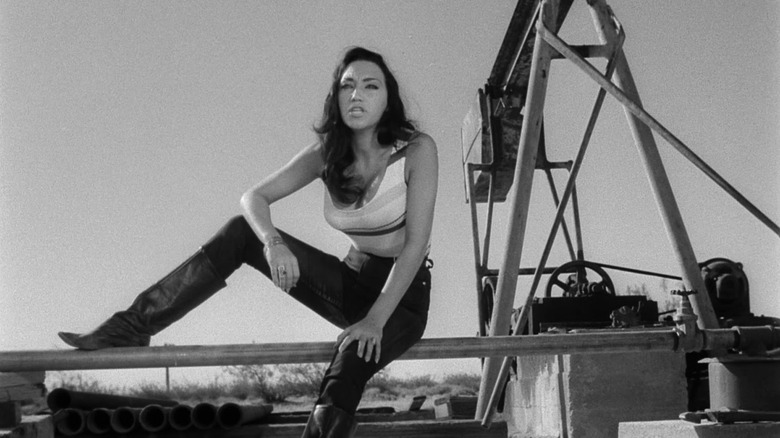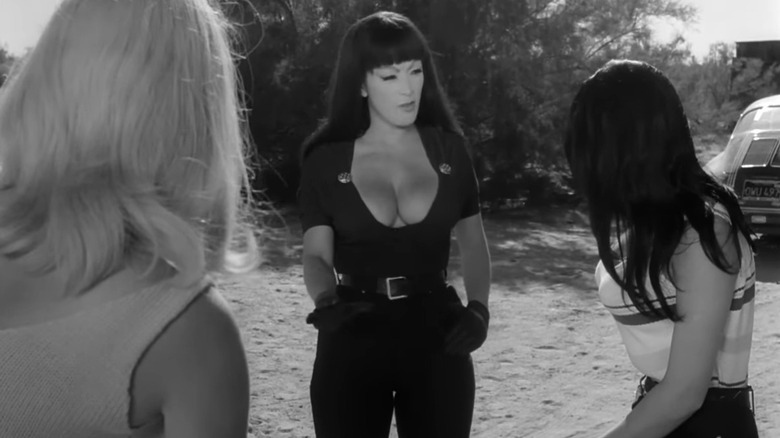The Daily Stream: Welcome To Violence! It's Faster, Pussycat! Kill! Kill!
Welcome to The Daily Stream, an ongoing series in which the /Film team shares what they've been watching, why it's worth checking out, and where you can stream it.
The Movie: "Faster, Pussycat! Kill! Kill!"
Where You Can Stream It: The Roku Channel, Plex
The Pitch: John Waters was once quoted as saying that Russ Meyer's 1965 violence epic, "Faster, Pussycat! Kill! Kill!," was "beyond a doubt, the best movie ever made. It is possibly better than any film that will be made in the future." It's difficult to argue with him. "Pussycat" is, in many ways, the purest distillation of cinema. On what might be its most basic level, films serve as a reflection of our own prurient desires reflected back at us. They exist to indulge our appetites for life's simplest, most lascivious things. We want to see violence. We want salacious, soap opera-like stories and brazen, wild sexuality. We want to see attractive people. In Russ Meyer's case — and there's no real delicate way to put this — he wanted to see massively buxom women take control of male-kind.
Meyer, however, for all his brazen objectification of the female form — along with acres of décolletage — never took agency away from his characters. The women in "Pussycat" are punk rock criminals who take what they want, hurt the men who target them, and are generally just badasses. They have complete control over their sexuality, and call out the men who would treat them as objects; when a leering gas station attendant talks about seeing the true America while staring down the blouse of Varla (Tura Satana), she snarls "You won't find it down there, Columbus." "Pussycat" is an exploitation movie, yes, but it is also an essay on the overpowering will of women.
Why it's essential viewing
The film's own opening narration sells "Faster, Pussycat!" pretty well. As a shimmering 35mm optical soundtrack runs down the screen, actor John Furlong belts out the following:
"Ladies and gentlemen, welcome to violence! The word and the act! While violence cloaks itself in a plethora of disguises, its favorite mantle still remain: Sex! Violence devours all it touches, its voracious appetite rarely fulfilled! Yet violence doesn't only destroy, it creates and molds as well! Let's examine closely then this dangerously evil creation, this new breed encased and contained within the supple skin of woman!"
This is the kind of pointedly bloviating language one might encounter in a scare film or a "social problems" cautionary drama about juvenile delinquents in the 1950s. There is little doubt that Meyer, born in 1922, would not have been familiar with a certain kind of "health" classroom industrial short, and he seems to be borrowing their unique patois. Indeed, the desert setting and abandoned oil rigs even give "Pussycat" an industrial look. But Meyer also understands a very basic truth about scare movies: Audiences go to see the sin, not the morals.
Surely tight-laced, conservative parents were given ample chance to click their tongues and lament the loss of "the old days" while watching clunky propaganda like "Reefer Madness," but the actual, not-so-secret appeal of propaganda to a conservative audience is to entertain with sex and violence. The baked-in "moral" would give otherwise "decent" folks a chance to watch exploitation material without having to say they went to an exploitation film.
What Meyer does is cut through the treacle. He throws in a vague moral at his film's conclusion — half-hearted at best — but he knows why we're here. Ladies and gentlemen, welcome to violence!
Welcome to violence
"Faster, Pussycat!" follows a trio of freelance go-go dancers, Varla, Rosie (Haji), and Billie (Lori Williams) spend their nights dancing for dollars, and their days racing their hot rods. One day, just for kicks, they have a desert race with a clean-cut square named Tommy (Ray Barlow) and his bubble teeny-bopper girlfriend Linda (Susan Bernard). When Varla wins, she leaps out of her car and breaks Tommy's spine. She then kidnaps Linda, intent on holding her for ransom. Rosie and Billie don't object morally, but decry Varla's lack of a solid plan.
While on the lam, the three women end up on the doorstep of a creepy old man (Stuart Lancaster) and his handsome son (bodybuilder Dennis Busch), a man built like a side of beef and about as smart. Billie targets him for sexual favors. Varla decides she'd rather have the old man's other son Kirk (Paul Trinka), while the old man horrifically begins ogling the panicking young Linda. The centerpiece of "Pussycat" is a dinner scene wherein all the major players gather around a table to snipe at one another and speak in that unusual poetry that only Russ Meyer could write.
"He cooks like his mom!"
"He doesn't sew too, does he?"
"Only his wild oats, honey!"
The film will climax with sex, and a violent chase through the desert. I will leave the fates of the characters for the reader to discover, only to say that criminals, in this twisted JD-film-inflected world, will get their comeuppance. Depending on who one might be rooting for during "Pussycat," the ending will be tragic.
Fun trivia: Quentin Tarantino once talked about remaking "Faster, Pussycat!"
Like a velvet glove cast in iron
Famously, critic B. Ruby Rich reviewed "Faster, Pussycat!" in the 1960s, and dismissed it as a shallow, male fantasy that was content to ogle. It took several decades and a re-visitation for her to see the film as something of a feminist masterpiece. This is a movie that appeals to very low fantasies, perhaps, but also empowers every one of its characters. The villain of the piece may functionally be Varla, but in practice, it's the Old Man. He is the one who leers and insults the women, and it is he who attempts an act of assault. Although living in a dying, ramshackle home, he still bears the amoral, privileged mien of American "Old Money." He bemoans: "Women! They let 'em vote, smoke and drive! Even put 'em in pants! And what happens? A Democrat for president!" He is a political throwback on the waning edge of the old ways.
Varla is the new generation, an appellation she received from the opening narration, which calls the protagonists a "rapacious new breed" that "prowls both alone and in packs, operating at any level, any time, anywhere, and with anybody! Who are they? One might be your secretary, your doctor's receptionist ... or a dancer in a go-go club!"
This "rapacious new breed" is, of course, the woman with the power and integrity to reject the old world of male dominance. The women in "Faster, Pussycat!" are feminist warriors, using movie violence to correct the misogynistic sins of countless past generations. Like a velvet glove cast in iron, these women will force the old men of the world to die out. Varla, Billie, and Rosie are cinematic martyrs, giving their lives for your grindhouse absolution.
Is it the best film ever made? One might merely say that the 2022 Sight & Sound poll overlooked something.



